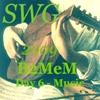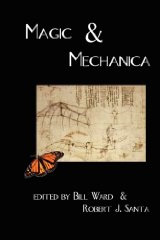Illuminations
 |
"Music can name the unnamable and communicate the unknowable." -Leonard Bernstein, American composer Write a story, poem or create an artwork where this quote is validated. |
I would go even further than Bernstein and say that this is an attribute of good artwork, period. A lot of my stories--or individual scenes in my stories--are inspired by music; with the emotion in place, as communicated by the music, it becomes a matter of building the story on top of that. I don't often succeed to the extent that I want, but I hope that the music that underlies such stories does color my prose nonetheless.
This story is deeply informed by the short story The Yellow Wall-Paper by Charlotte Perkins Gilman.
Song of Creation Denied and Thwarted
After being shouted at already by his father for being careless with the door, Pengolodh let it shut almost silently behind him. He did not mean to overhear the conversation in the parlor, and had he been less conscious of not thundering up the stairs (for which he had also been shouted at), then maybe he would have ascended fast enough not to notice what was being said. As it was, though, rolling his feet carefully, riser after riser, he heard enough to make his step falter into shameless eavesdropping.
"She wants her paints. She says she will only add color to what she had already done in ink before--" His father's voice, stern but melting into some more vulnerable at the end, trailing away, as he never allowed happen. This is what made Pengolodh's step falter.
"I'm afraid that is not a good idea." The droning voice of the healer, perhaps bored already with these ambitious Noldorin craftswomen. "I understand her desire for expression, but keep the paints crated. I have brought --"
There was a rustling of something being taken from a box.
"A harp? My wife has never played--"
"It is a way to release the emotion without jeopardizing her health. She is frail, Sailaheru." Pengolodh's foot--poised above the next riser--stayed itself in midair. There was something almost fraternal in the use of his father's unadorned first name. Few called him that, save Pengolodh's mother and others trusted in his father's confidence. He had never known that the healer--though he came on recommendation of Lord Turukáno himself--had achieved such … yet, Pengolodh told himself, it was logical, for the healer had been here well past the decent hours for a week now. A week today, exactly.
"This was an ordeal for her, Sailaheru. I cannot emphasize this enough. She does not need to work; she needs to rest, and while it is fair of her to expect to have outlet for her emotions, then that must not come as writing or painting. She has borne two children now. The failings of women are very different than our own failings, and we must understand what she needs right now."
"But she says--"
"She would. She would. But she is gone weak, and we must do what we must to make her strong again."
Pengolodh let his foot settle on the next riser, but he did not lift his weight. He swallowed hard. He could feel his pulse pounding where he clutched the banister. Is that true? he wondered. Is Amil truly weak? He'd never thought of her that way, certainly. A place as her apprentice was the envy and dread of all the illumination students, and when she stood to speak at the historian's guild, silence fell abrupt as a stone from a palm suddenly opened. Even those wont to argue ceased speaking, mid-sentence. Pengolodh had seen it himself. His father's approval was a rarely earned prize, but Amil's--
The healer had been trained in Lórien, one of the few that had not gone over with the Fëanárians. He had that authority, and his voice dripped with it. Pengolodh felt his former impressions shift ever so slightly.
"I just do not know …" There was something naked in his father's voice. Pengolodh felt as though he was gazing in at something opened on the anatomist's table that he should never have to see in a man alive. Pengolodh let his next foot fall. He wished he had not lingered so. He found it hard to imagine that voice shouting at him.
"Of course you do not. We have studied it. We know. It is the female constitution. She is weakened when she bears children. She has done so twice now, and lost one--"
Mindless of the noise, Pengolodh took the last three stairs and, in long strides, arrived at his room, slammed the door, fell against it--his pounding heart obscuring any further sound from the parlor downstairs--slid to the floor, remained there until the dark dripped down fully into the west, till night came and he slept where he sat.
He awakened later to music played upon the harp. His mother could not play. Other Noldorin girls in Valinor, he knew, had studied at weaving and music, but Coinúrë walked for an hour each day, up the slopes of Taniquetil, to get underfoot at Manwë's scriptorium until they plunked her down at a desk of her own, with paints and vellum and brushes of her own, to keep her out of the way. The story was not romantic when she told it. It was described in the same tone as those who had crossed the Ice told of rescuing rotting fruit from the bottoms of backpacks and mixing it with ice to eat.
The notes were discordant, expected from one who understood how many things fit together but not notes of music: gagging chords and huge splaying glissandos and notes that toppled one upon the other in wincing disarray. Pengolodh lifted his hands but could not force them down upon his ears. His fingertips trembled at his temples. There was an emotion in the song, but it was an emotion for which no word had ever been uttered, an emotion known only to those whose imaginations reeled and blood surged and felt that they would burst but for an act of creation; it was the emotion of that creation denied and thwarted. He was not surprised when the song ended with the sound of shattering wood.
Return to Library
Return to Table of Contents and Foreword






